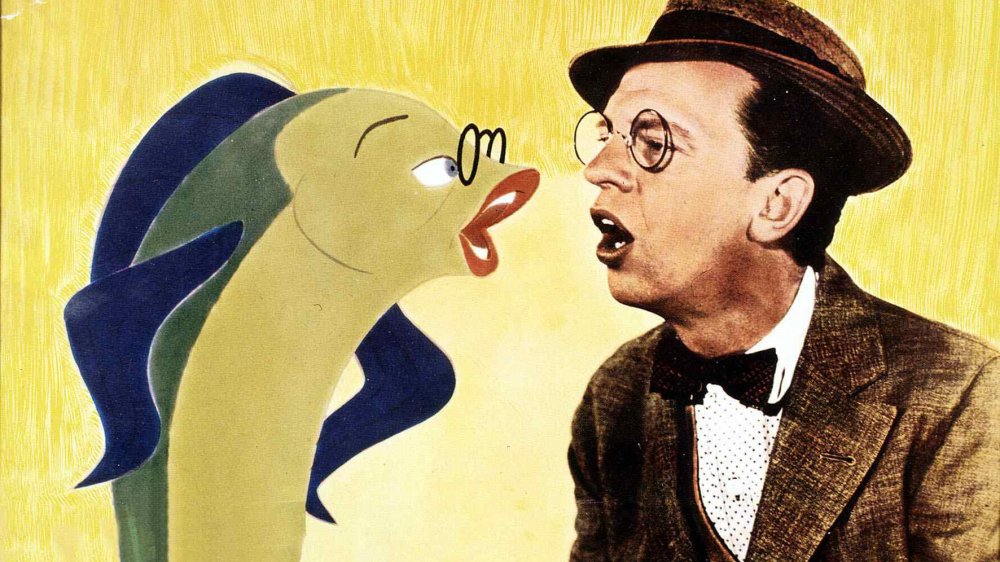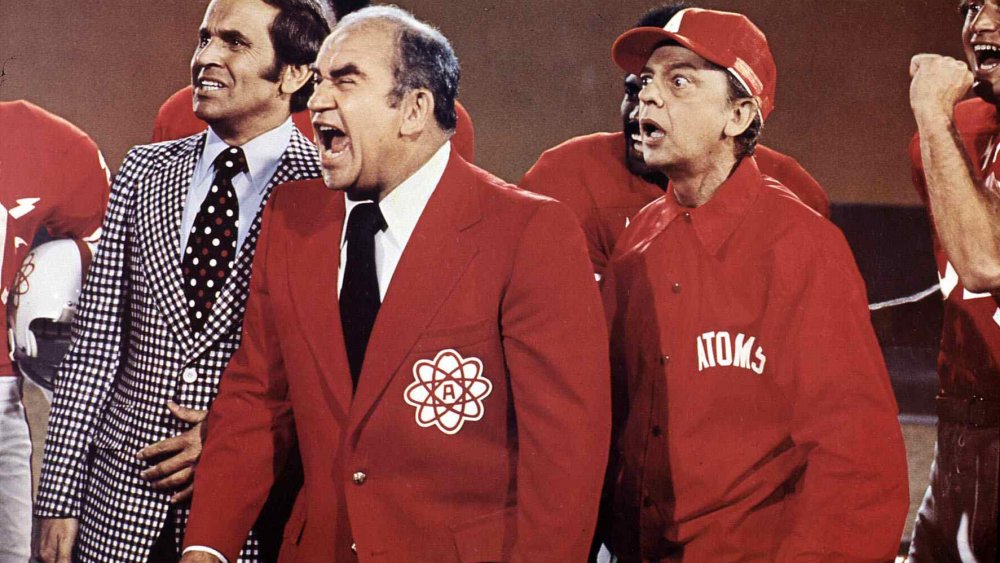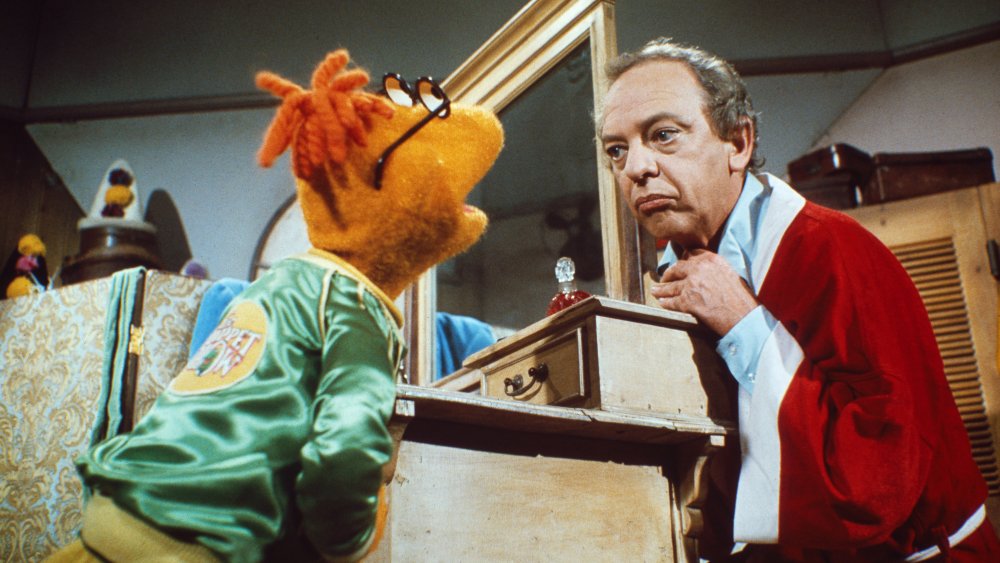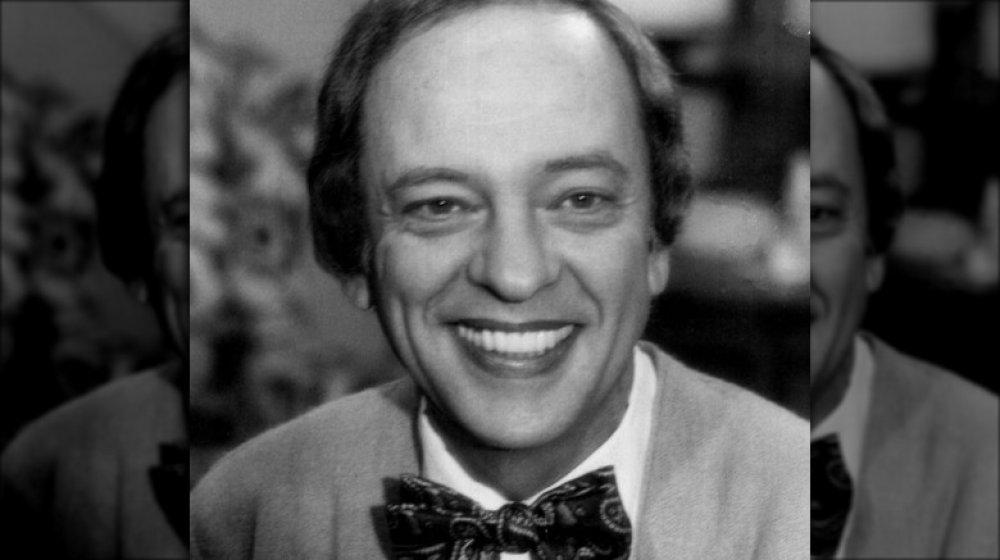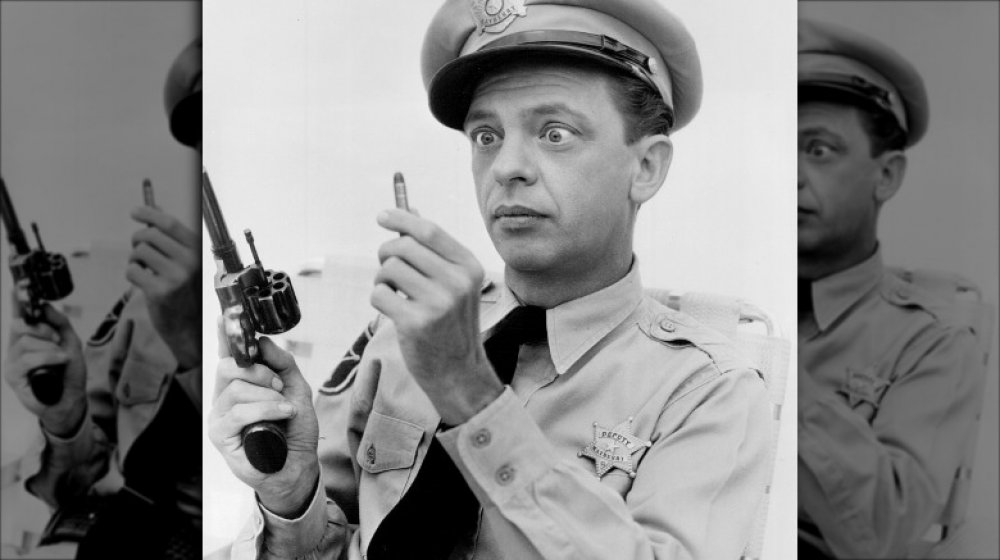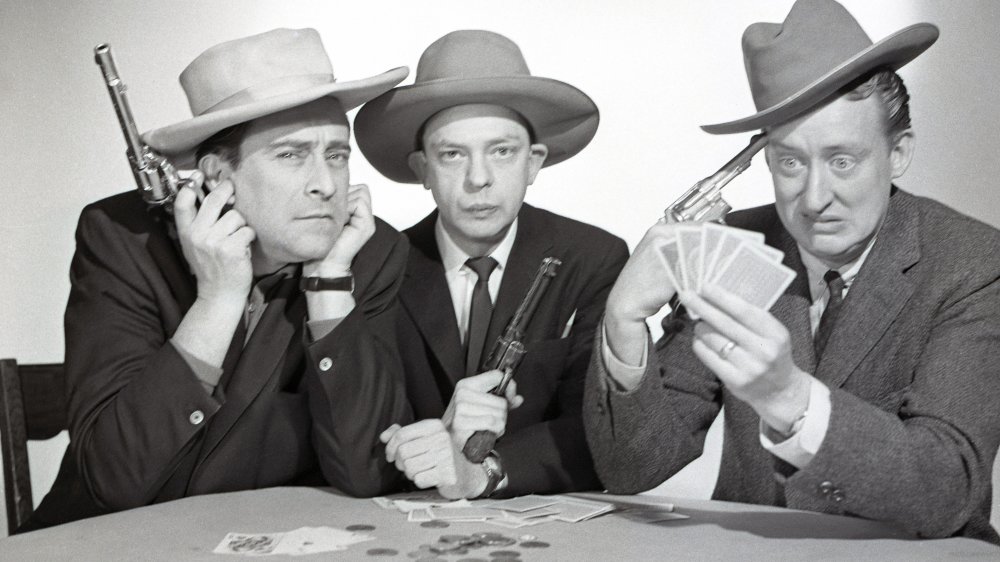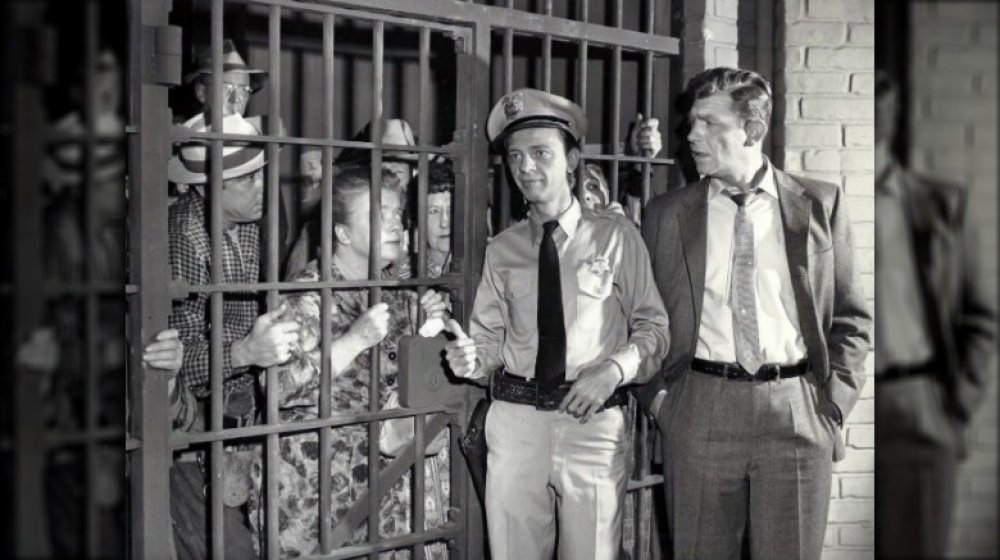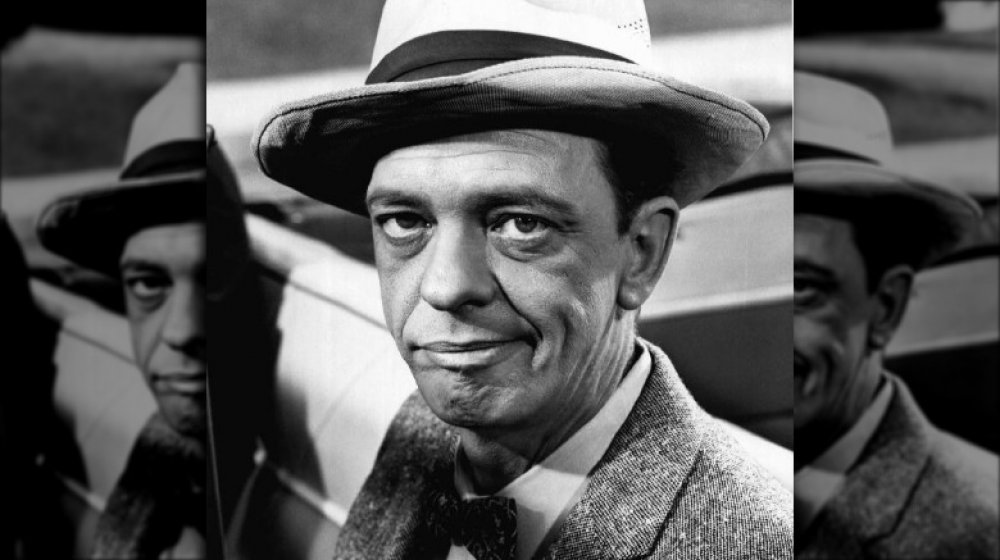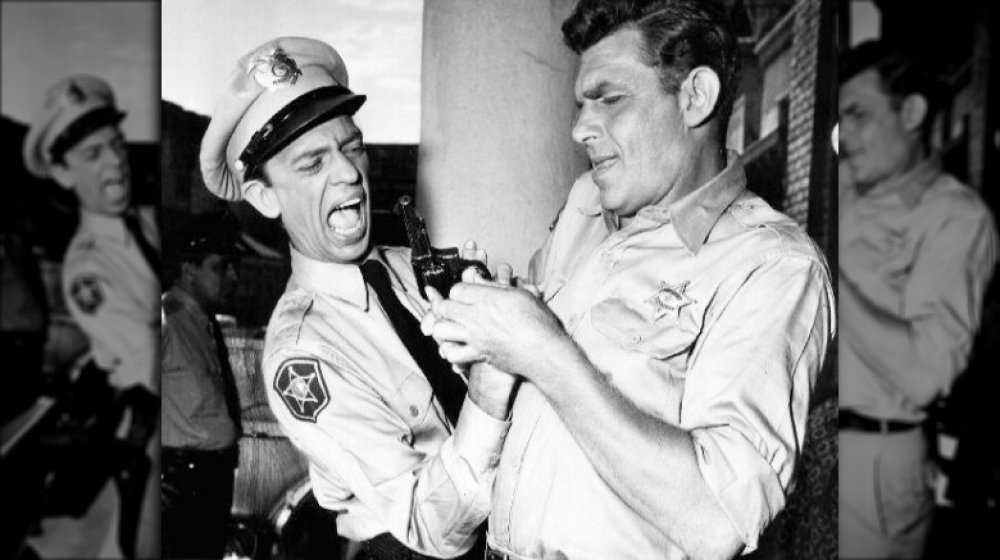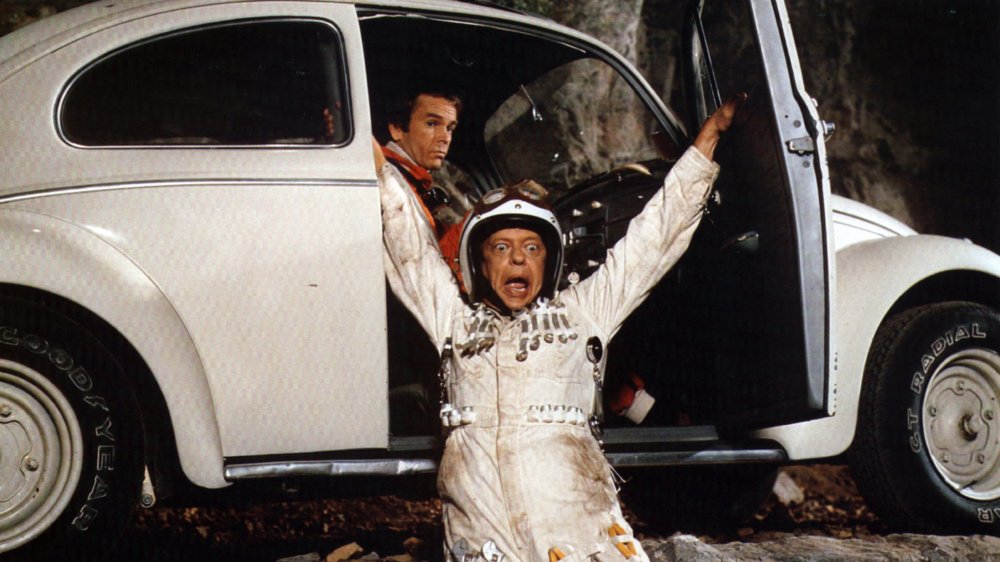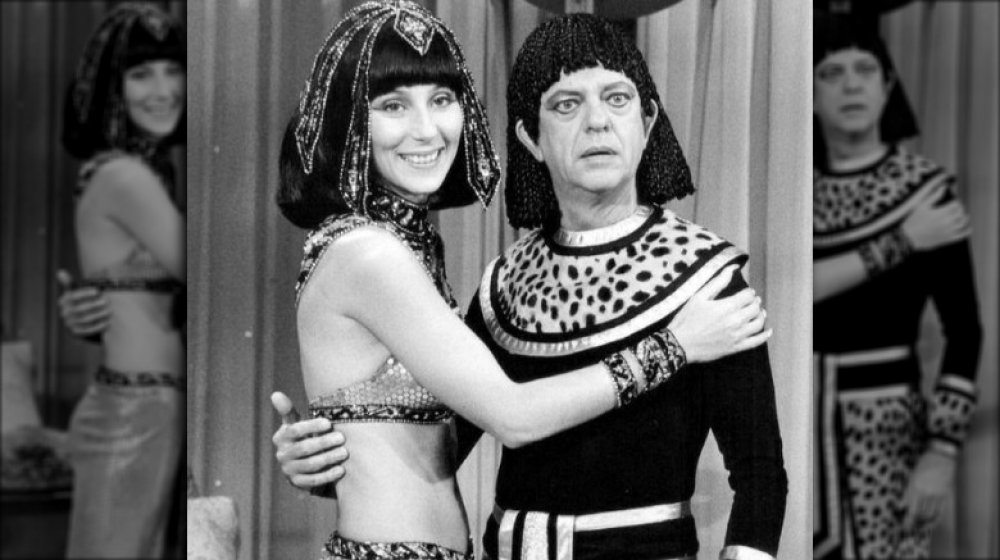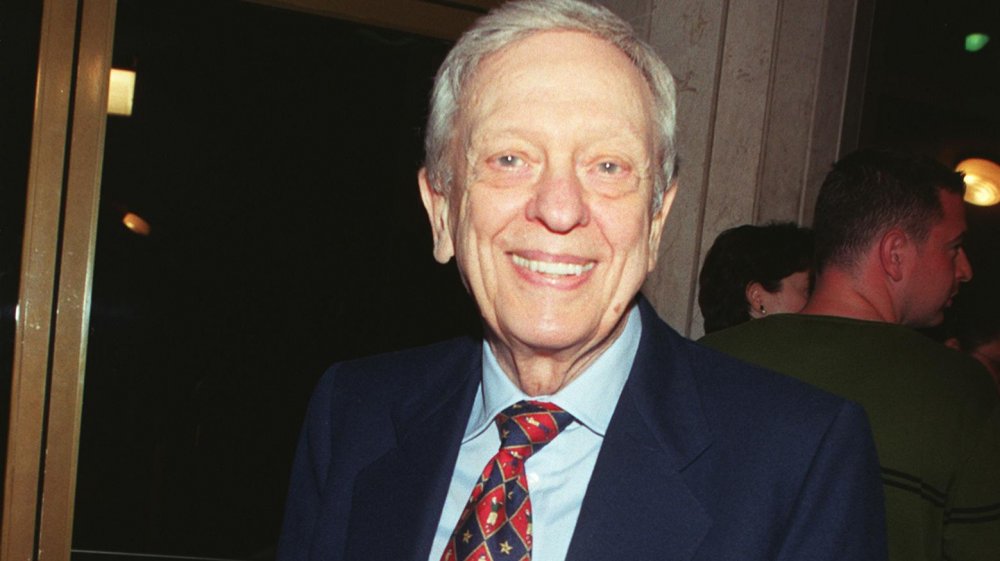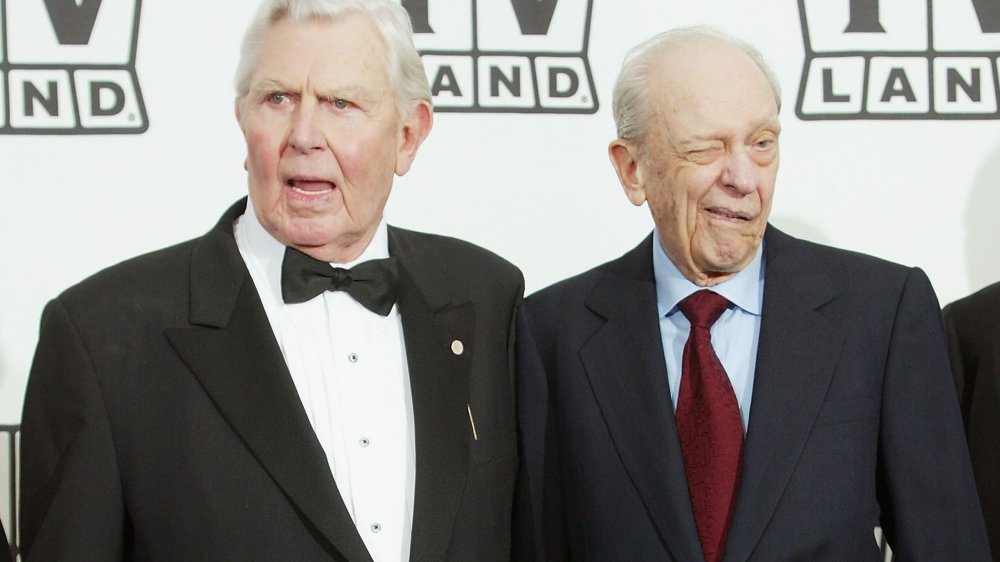The Tragic Real-Life Story Of Don Knotts
The term "national treasure" might get tossed around a lot, but if there's anyone that it actually, honest-to-gosh should be applied to, it's Don Knotts.
The Andy Griffith Show remains a quintessential piece of Americana: It's a throwback to different times, when everyone in town knew everyone else, when neighbors were more than willing to lend a hand when and where help was needed, and when police work could be done by a very excited man who could carry a gun ... as long as he kept his one bullet safely tucked away in his pocket.
Knotts was, of course, Deputy Sheriff Barney Fife, and it's still the role he's most remembered for. However, he did have a long career that included Three's Company and movies like The Ghost and Mr. Chicken, but it's The Andy Griffith Show that has remained a go-to when you're looking for a little wholesome, classic television. Epically funny and classically hilarious, Knotts might be remembered as a funnyman, but his life was full of sadness and tragedy.
Knotts' parents weren't the greatest
Jesse Donald Knotts was born in Morgantown, West Virginia in 1924. When author Daniel de Visé did a deep-dive into Knotts' childhood in his book Andy and Don: The Making of a Friendship and a Classic American TV Show, he wrote (via Delancey Place) that his childhood was horrible. Knotts was an accidental child that came along 14 years after his next closest sibling. His two older brothers shared their bedroom with the family's boarder while Knotts slept on a cot in the kitchen.
His father, Jesse Sr., was mostly bedridden by the time he was born. Closer Weekly says the elder Knotts was a schizophrenic alcoholic, while The New York Times adds that he also suffered from hysterical blindness.
Abuse was a regular part of his childhood. Around age 30, Knotts' mother Elsie asked him if he remembered a horrifying confrontation where his father had threatened him with a knife. In order to get from his kitchen bedroom to literally anywhere else, he needed to walk through the living room, and past the sofa where his father spent most of his time. Sometimes, young Don could sneak by. Otherwise, it invariably ended with threats.
It's no wonder, then, that as a young boy, Don Knotts was already pale, thin, and was regularly sick. He'd later recall: "I did not come into the world with a great deal of promise."
Knotts had a difficult relationship with his brothers
Daniel de Visé, author of Andy and Don: The Making of a Friendship and a Classic American TV Show, has a personal connection to Knotts: They were brothers-in-law. He wrote (via Delancey Place) that Knotts' relationship with his brothers was complicated, and they were hardly distinguishable "from the vagabonds who paraded in and out of the University Avenue home." His older brothers were William Earl, who was so thin that everyone called him Shadow, and Sid.
They were funny, says The New York Times, a difficult thing to be when there was so little to laugh about. But there was more to it. Knotts' daughter Karen would later tell Closer Weekly that her father was mistreated by his brothers, too. They were often drunk and they often fought, until Shadow tragically died after suffering an asthma attack. Knotts was only a teenager at the time.
It's difficult to imagine growing up in that kind of environment with that kind of fear, and Don Knotts had a deep desire for happiness. He later revealed some of the coping mechanisms he used, saying (via the LA Review of Books) that he managed to find some comfort "by filling my space with imaginary characters with whom I would act out some happy drama."
Don Knotts didn't feel free until high school
While his home life had been a source of constant terror, things started to improve as he entered his teenage years. His daughter, Karen, told Closer Weekly: "When his father passed, he was 13 years old. At that point, that burden — that huge burden — lifted off him, and he became old enough that he was able to get the other brother under control, so he was no longer terrorized at home."
Karen Knotts recalled that once her father entered high school, he "just blossomed." He was class president, he had a yearbook column, he was popular, and he had a best friend for the first time. But in 1976, he told the Los Angeles Times he had a slightly different view of his youth.
"I felt like a loser," he recalled. "I was unhappy, I think, most of the time. We were terribly poor, and I hated my size."
It's perhaps not entirely surprising, then, that it was during Don Knotts' early teens that he turned to a friend named Danny. Who was Danny? A ventriloquist's dummy, and with the dummy, he started performing.
The rumors of Don Knotts' military career
There's an oft-repeated rumor about comedian Don Knotts that's actually somewhat cruel. It's the one that says he was once an incredibly strict Marine Corps Drill Instructor. The story, says Snopes, absolutely isn't true, and it's been repeated as a part of a series of urban legends about unlikely-looking celebrities having a hidden military past. (It's the same idea behind Mister Rogers as a military sniper, for example.)
It also ignores his actual military service. According to The New York Times, when World War II rolled around, everyone was convinced that the military wouldn't take such a sickly, undernourished man. But they did, and they found the perfect place for him. Knotts toured the Pacific front as a member of the comedy troupe Stars and Gripes, who were tasked with entertaining the troops. (According to Together We Served, he also worked as a nurse when those services were needed.)
It was while he was in the military — and still performing with Danny the ventriloquist's dummy — that he caught the eye of another, older comedian named Red Ford. Ford's comments stuck with him, and he would remember what he said years later: "You know something? You're a funny little son of a b***h."
By the time he was out, he wasn't a ventriloquist anymore. He had moved on to other types of comedy, and according to Appalachian Talk, he threw Danny off of a ship while he was somewhere in the South Pacific.
Knotts got roles because he made others look good
After the military — and after he graduated from West Virginia University with a degree in education in 1948 — Don Knotts headed for New York City. He had $100 in his pocket, according to the LA Times, and his career started out like many: He was rejected. He was turned down for a series of radio gigs then landed a spot on a soap opera, but it took seven years before he got a role on Broadway, some attention, and a co-star that would become a lifelong friend. That co-star was Andy Griffith, and the play was a comedy called No Time for Sergeants.
From there, he started making a reputation as the perfect person to play a certain type of character: nervous, anxious, and non-threatening. And here's the thing: The New York Times says that he absolutely stole some of the material he was doing, and those he stole from were largely fine with it. Why? For the same reason, he was given roles opposite other male comics and actors. The small, thin, nervous Knotts was the perfect sidekick to make others look more manly. Knotts, the NYT explains, made anyone look "one step closer to leading men."
Don Knotts struggled with hypochondria and anxiety
It was Don Knotts who went to Andy Griffith and suggested himself for the role of Barney Fife, and according to the LA Times, he was almost joking when he said it. But Griffith absolutely went for it, and it was a match made in TV heaven. Knotts had made it and found the success that most aspiring actors and comedians could only dream of, but not all was well behind the scenes.
According to writer Daniel de Visé, via the Charlotte Observer, Knotts had long struggled with massive feelings of inferiority. Long before he even made it to the small screen alongside Andy Griffith, he would become so distraught that before a performance, he might spend days in bed. In the 1950s, his doctors gave him a prescription for anti-anxiety drugs, to which he became addicted.
Wrapped up with his anxiety was hypochondria, too, along with chronic insomnia. De Visé says (via the LA Review of Books) that insomnia, at least, stemmed from a tendency to stay out too late ... and enjoy the company of too many women. But he also says that Knotts quit all his bad habits with the snap of his fingers. After an accidental overdose of sleeping pills — along with an ultimatum from his third wife — Knotts changed at least some of his ways.
Don Knotts coped in therapy
While success did come for the poor boy from West Virginia, Don Knotts' daughter Karen told Closer Weekly that the long, hard years of his childhood definitely left their mark. "Things came back to haunt him," she said.
Another part, according to author Daniel de Visé, via the LA Review of Books, was that Knotts had difficulty reconciling his lives. He constantly played characters who were submissive, anxious, nervous, and often, the butt of the joke, and at the same time, he'd found more success than he'd ever imagined. Reconciling those two things proved difficult, and de Visé says that Knotts was a good way into his career when he found himself sitting in the office of a Hollywood therapist, screaming "F*** you, God!" in an attempt to rid himself of depression, self-doubt, and the lessons of his "Bible-thumping father."
Still, Knotts' daughter, Karen, remembered: "He was mercurial. He had a lot of different kinds of moods. He fought a lot of depression and I helped him, or thought I did, because I could see how he had this endless loop of thought that would always lead to a downward spiral. [...] By the end, he had overcome everything that was down in his life. I felt really, really proud of him for all the work that he put into being a happy person. And the truth is, he loved people."
Knotts was incredibly underappreciated
There are a few different stories as to why Don Knotts left The Andy Griffith Show. His daughter, Karen, told Closer Weekly that it was "hard, hard work," and "There's only so many stories you can tell." According to the LA Times, though, Knotts had only ever intended on doing five seasons of the show when it started — and that's what he did. In 1967, he told them, "The grind gets to you in television, and that's primarily the reason I'm concentrating on pictures."
The Andy Griffith Show continued on without him — for the most part, as he did continue to make the occasional guest appearance. But the general consensus is that without Knotts, it just wasn't the same — it became just another one of a bunch of 1960s shows. There is a positive here, though, and that's the fact that Griffith and Knotts remained friends.
The tragedy, on the other hand, is that Knotts never quite made it in the movie career that he'd been hoping for. After leaving TV, he'd scored a five-film deal with Universal. In hindsight, movies like The Incredible Mr. Limpet, The Reluctant Astronaut, and The Ghost and Mr. Chicken were absolutely brilliant. Not only did Mr. Limpet kickstart the idea of mixing animation and live action, but later comedians from Martin Short to Jim Carrey have cited them — and Knotts himself — as a major inspiration. Unfortunately, at the time, Knotts didn't see the critical acclaim that he thought he should have.
Don Knotts struggled with blindness
When Knotts was only 57 years old, he was given a troubling diagnosis of macular degeneration. According to the Mayo Clinic, the condition interferes with a person's ability to see directly in front of them and makes anything in their direct line of sight appear distorted or blurry. In some cases, it can even lead to an inability to recognize faces, and it usually gets progressively worse.
Knotts struggled with the diagnosis. Per The New York Times, Knotts once said, "I got pretty depressed for a while. And then one day I said to myself, 'I bet a blind person would give his right arm to have the vision I have.'"
Knotts continued to work, and according to the American Macular Degeneration Foundation, he continued to participate in his favorite hobby: swimming laps. Eventually, though, his eyesight had deteriorated to the point where he could no longer drive or read.
When Don Knotts was given his own show, it flopped
Variety shows were all the rage at one point, and that was around the time Don Knotts was given one of his own. After leaving The Andy Griffith Show, he got the chance to host The Don Knotts Show. It premiered in 1970, and at a glance, it seemed like it had everything that would have made it a major hit. According to MeTV, they had given the show 22 weeks to make an impact ... and it didn't.
"We did all kinds of things," Knotts later explained. "There was tremendous competition that season for variety, because everybody and his brother had a variety show."
The show was on NBC, and Knotts went on to say that they essentially had stolen him away from CBS (which was the home of The Andy Griffith Show). That didn't go over well, but everyone had been so convinced it was going to be a hit that they didn't see where it could possibly go wrong.
The Andy Griffith Show director Bob Sweeney was even brought in to try to fix things, M*A*S*H's Gary Burghoff was brought in as a recurring sketch comedy character, and they even debuted acts like The Carpenters. Still, it came to a premature end, while Don Knotts continued to make appearances on other variety shows.
Don Knotts' daughter left his deathbed to laugh
It was in the early 2000s that Closer Weekly reports that Don Knotts was diagnosed with lung cancer. By that time, he and longtime friend Andy Griffith had fallen a bit out of touch, but Griffith rushed to his side and was right there with him as he fought it. According to their Matlock co-star Nancy Stafford, "As soon as the two of them were together, it was like they never skipped a beat. They fell into this routine of singing, laughing, and telling jokes together — it was hysterical. They had this amazing communication."
Unfortunately, Knotts would ultimately lose his battle with cancer. In 2020 — 14 years after his passing — his daughter, Karen, shared some regrets (via Closer Weekly).
"Here's the thing about my dad," she said. "He had this funniness that was just completely, insanely natural. When he was dying, he was making us laugh in hysterics. He was literally dying, but he did something or said something that caused my stepmother and I to go into fits of laughter, which is why I ran out."
And that is what Karen Knotts regretted: Leaving her dad's side to laugh. She added that she had been telling the story to the director Howard Storm, who told her she should have stayed, laughed out loud, and let him hear her. "He was right; I should have just stood there and blasted out laughing," Karen reflected.
Unspecified health problems and death
Don Knotts passed away on February 24, 2006, and People reported that one of the very last people to go and sit at his bedside was Andy Griffith. Griffith later recalled: "I told him I loved him and I held his hand. [...] his chest heaved several times, and I believe he heard my voice."
Knotts, they said, had quit smoking decades prior to his diagnosis, and even when he heard the news, he remained upbeat and positive. One thing he didn't do was tell his children that he was going through chemo because he had fully intended on beating it and going on with life as if nothing bad had happened — as if it were just a little bump in the road.
The official cause of death was "pulmonary and respiratory complications," and reports suggest Don Knotts had been struggling with "unspecified health problems" that had required he cancel appearances in the previous years.
In the end, Don Knotts' closest friends remembered him fondly. Andy Griffith commented, "He was modest, he was humble, and he was very bright," while Ron Howard added, "He was just one of those truly kind people."
